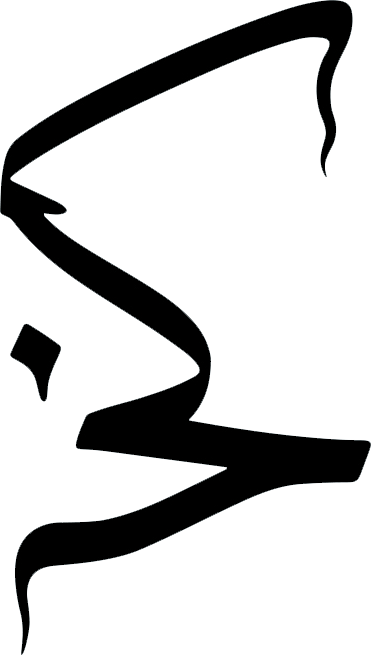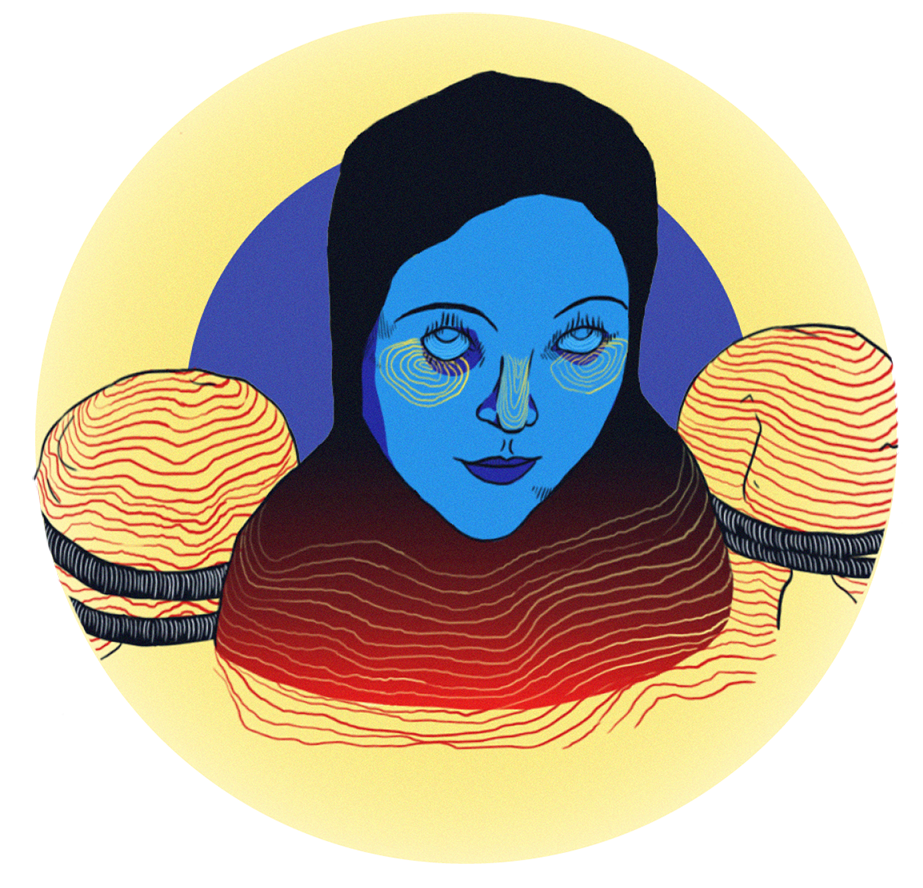Dual Transcendence
by Yasmine Rukia
This work appears in Khabar Keslan Issue 1. DISORIENT
Original artwork by Paloma Martinez-Miranda
Male-dominated institutions can’t structure female spirituality
On the steps of a mosque, a woman sits between two men. This woman, an unnamed She, is draped in black. On one side of her heart-shaped face, an inky wing juts from her eyelid and her cheeks are blushed. She is staring to her left. To the right when she looks, her face is a clean slate and her eyes are soft with compassion.
They are mute among the plotted plants and red mulch, wiry shrubs and Japanese maples, until the call for prayer.
Simultaneously, under their breath, they all mutter the first three of the ninety-nine. These three are daily incantations and two of them are grammatically feminine: “In the name of Allah, the Compassionate, and the Merciful.” Both words الرَّحْمٰنِ (Compassionate) and الرَّحِيْمِ (Merciful) are linguistically rooted in the word, womb (م ح ر). God is neither male nor female but a genderless paradox worthy of our worship. It is only through linguistic facets that this genderless paradox exists; through this linguistic paradigm they contain both the feminine and masculine equally.
Society doesn’t reflect this harmony, however, nor does it care to. The feminine mystique that is praised in pagan religions of old goddesses and gnostic traditions of the saint are in direct opposition to the Islam’s representation of the female, wherein women have been demonized, sexualized, and infantilized, regardless of having made social and cultural strides such as almost gaining the right to vote globally. Women are merely mothers, daughters, sisters, wives, obedient and, if none of the above, they are defaulted to being “whores.”
“The status of women,” or rather, the way in which womanhood is understood, practiced, and communicated, is a stale topic that has deviated from salient truth: women are people, just like men; we give life, but are often forgotten; we’re humble goddesses, nonetheless hungry for respect. The duality in our nature—of being human yet god-like—mirrors the paradox of God’s lack of gender: both contain and manifest a spectrum of being. The devil, however, is in the details, from east to west, and west to east. Women’s bodies and appearances are the battlefronts of cultural hegemony and supremacy, whether hijab or size two, or tragically both. Women inhabit a space that revolves around their inherent duality: both sacred and disrespected, thanks to their gender.
The status of women, then, is never actually about women; it’s about power and the access to it. Those who dominate (read: men) control the way in which women are represented, tilting the balance of God’s own genderless paradox to an oppressive imbalance. Men decide that women can’t lead, can’t be trusted, are temptresses, and emotional-meltdown queens. And, for some women, this status quo is too good of a lie to leave behind.
But, back to the woman sitting on the steps of the mosque. She is in two places at once. She thrives, despite obstacles: a pokey, pungent flower growing through the brown grout cracks in cool grey cement.
The three rise and walk through the heavy oak doors carved with arabesque stars of the mosque and stop before the lush green carpet within. The two men take off their shoes and walk into the plush enclave for prayer. She instead beelines for the bathroom and enters a stall. She’s read, and re-read, the Quran for mention of taboo and Googles it again on her smart phone, contemplating her female dilemma. She is reassured after finding that the single utterance of menstruation flow coincides with sex. Can’t have it if you’re ragging, but nothing connecting it with prayer. Jurisprudence is written by men who don’t bleed, and she thinks of the women who cry “It’s a mercy!” when they can skip out on ritual guilt-free. She bidets generously like always, and decides she will do it. Her biology doesn’t have to, and won’t, get in the way of her worship. If she’s wrong, she’ll find out on the day of reckoning. She puts the ‘urf of the ummah on the back-burner.
Geo-political turbulence—borne of the colonialist drone strikes and coup-d’etats ravaging the Middle East—compromises the free-choice clause of the Quran, which says that there is no compulsion in religion (2:256). Order and structure are prized over God-given right and the state arbitrates on judgment day. Much like the American patriarchy—filled with asses and elephants, where men make decisions about women’s bodies—the women’s councils of Islamic theocracy are female ghost-towns.
She stares at her reflection in the bathroom mirror and soothes the fringes of her hijab. She wraps and re-wraps it until she is a presentable package. She feels good, looks good, and knows herself to be lucky.
What is a piece of cloth, anyway? she thinks to herself as she re-enters the prayer room and takes her spot in the back with the women. That no children are screaming is usually a good sign before prayer, as are colorful hijabs and maxi dresses with cardigans. She isn’t the odd one out this time. She scoffs at the segregation. Somehow her body is inherently sexual without meaning to be. But her anger fades with each touch of her head to ground and back. The power of gathering for prayer sets her at ease, regardless of the gendered imbalance of power she acknowledges around her.
Hijab is consent. Hijabis are ummah personified: not just individuals, but the boundaries of east and west. When men talk about women in classical Islam and even today, the consent of the woman is sacrificed for the whole of the ummah to remain “authentic,” to strengthen the mainstream romantic narrative of Muslim women as the mothers of believers, designated “flag-bearers.” Women in seventh century Arabia were mere property; things were done without their consent. Islam laid the framework for the progression of women in society, whether it was through the right to divorce—compare that to 1970 in the US; to inherit; to work, and to witness—at twice the rate of men in a blooming legal system.
The three, the two men and one woman, leave the mosque together. Their strides match in rhythm over the glossy granite floors, polished steps, past the shrubbery and cracked asphalt. They pile into a Ford Fusion and drive home.
“The status of women” is a question the beginning dispelled, in the name of the compassionate, the merciful, the womb: you have no power here.
Yasmine Rukia is a no-normal radical thinking muslim who dabbles in short stories. An Arabesque-American trying to explain the unexplainable, sometimes, always.

